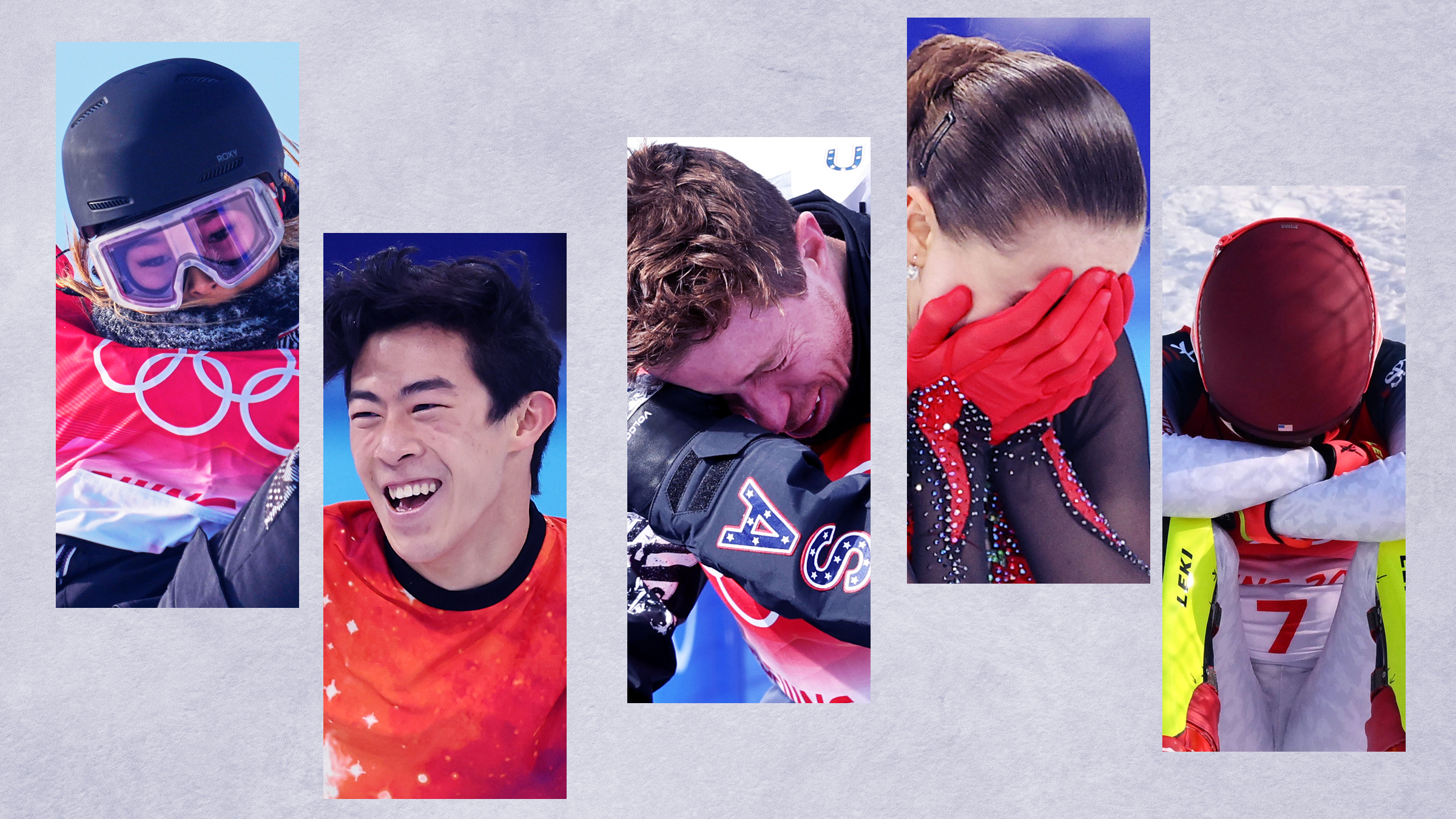Timothy LeDuc made history at the 2019 U.S. Figure Skating Championships.
LeDuc, who identifies as non-binary, became the first openly gay athlete to win a U.S. pairs title, capturing gold with partner Ashley Cain-Gribble.
Three years later, the 31-year-old LeDuc has a chance to make history again at the same event.
LeDuc and Cain-Gribble competed at this week’s 2022 U.S. Figure Skating Championships, looking to lock down their spots on Team USA for February’s 2022 Beijing Games. And they succeeded! LeDuc is officially the first publicly out non-binary Winter Olympian.
The Hurricane season is on. Our meteorologists are ready. Sign up for the NBC 6 Weather newsletter to get the latest forecast in your inbox.
On NBCLX’s latest ”My New Favorite Olympian” podcast, LeDuc opened up about coming out to their family, not always being accepted for who they are within the figure skating community, why their partnership with Cain-Gribble works so well and much more:
‘I believed the lies that I was told’
Beijing 2022 Winter Olympics
Watch all the action from the Beijing Olympics live on NBC
LeDuc first came out as gay when they were 18 years old. The Cedar Rapids, Iowa, native woke up their parents, Becky and Mike LeDuc, in the middle of one night to inform them.
“Our first reaction I remember was, inside it was a little bit of a shock and a little bit of very troubling at the time because of our background,” Mike said.
The background Mike was referencing was the family’s church background. The LeDuc family was part of a “fairly traditional evangelical church” which “traditionally views the LGBT lifestyle as immoral,” according to Mike. So Timothy didn't initially receive support from their family after coming out.
“[My parents’] initial reaction was, ‘We love you, but we need to change you,’” Timothy said. “‘We need to fix this problem.’”
“It was very difficult with my family at first,” they added. “I was in a very Christian, conservative environment, going to church so many times a week. I believed the lies that I was told that I was an abomination.”
In fact, Timothy said one of their family members brought in people from a church group that “basically tried to perform an exorcism.”
“At one point, one of my family members brought friends home from a church group, and they basically tried to perform an exorcism on me, tried to cast my demons out and were praying on all sides of me.”
‘Act like a boy’
The figure skating community hasn’t always exactly wrapped its arms around Timothy either. LeDuc shared personal stories of discrimination and a lack of empathy they faced while competing.
“I couldn’t hide my queerness,” LeDuc said. “I had a tryout with a girl once and she decided not to skate with me because she thought me being gay was going to be a liability. It was not an option for her. In an otherwise great partnership that girl and I could have had, she didn't want to dance with me because I was a queer person.
“I literally had a coach, just final words before I went out to skate in a world-level competition, (who) pulled me in and said, ‘Timothy, go out and show them how masculine you are. That's how you will win.’
"For me, as a person that exists and really thrives outside of the binary, it can be very complicated sometimes navigating a gendered sport. There are going to be people that don't understand it. You know, they look at me, they see that I have a beard or they look at maybe my physical characteristics and say, ‘You're a boy, act like a boy. What are you doing?’”
These aren’t the first tales of figure skaters receiving pushback for breaking out of traditional gender norms.
Debi Thomas, the first African American to medal at the Winter Olympics, wore a unitard at the 1988 Winter Games in Calgary. Later that year, the International Skating Union introduced a rule that female skaters must wear a skirt covering the hips and posterior, meaning unitards and leotards couldn’t be donned by women. The rule was in place up until 2004.
At the 2010 Vancouver Games, a pair of Canadian commentators questioned whether American Johnny Weir, who came out as gay in 2011, might have been docked points for his attire and mannerisms, and said Weir was setting a bad example for other male skaters. One also commented that Weir should have to take a gender test.
“Figure skating is subjective, which makes it different from so many other sports,” said Weir, who is now a figure skating analyst for NBC. “You are a character and who you are down to, what kind of family you come from, the costumes you wear, what coach you take from, what color your hair is -- all of those things can affect the way that you're seen by a panel of judges that are essentially deciding your entire future and the worth of your whole life.
“I was raked over the coals for wearing rhinestones, and it wasn't butch enough. It wasn't masculine enough. It wasn't the all-American boy that America really wanted to sell.”
"The moves [in figure skating] are all gendered in that the man lifts the woman, which was actually 'the man lifts the lady' until the end of June of this year,” said Erica Rand, who is a professor of art and visual culture and of gender and sexuality studies at Bates College. “The fact that the International Skating Union changed the term 'lady' to “woman' just in June of 2021 tells you something about gender expectations in the sport."
‘We never wanted to be what was looked at as the traditional team’
LeDuc and Cain-Gribble, 26, met in 2016 and the two have gone on to form a non-traditional pairing.
They are both on the taller side compared to their competitors, with Cain-Gribble standing 5-foot-6 and LeDuc at 6-foot-1. And their performances are also a diversion from the often-seen romantic style of pair skating.
“Ashley understands, I think, my struggle for finding authenticity as well, because she's a taller pair girl and she's always been told she's too tall, that her body is not good enough, that her body is not right. It doesn't fit into this archetype that we've defined for success in figure skating,” LeDuc said.
“I don't think Ashley was really ever interested in being the fragile girl. She's such a powerful, amazing athlete. So for her, when I kind of came to her and said, ‘You know, I don't really want to do this romantic style, it doesn't really seem like us.’ She was like, ‘Heck yeah, I'm good with that.’”
“When Timothy and I teamed up, we never wanted to be what was looked at as the traditional team,” Cain-Gribble said.
“And it’s not just because Timothy is a queer athlete or because I’m married. It’s just because it’s not the story that we are wanting for us. It’s not true to who we are as a team.”
When the two skated to a first-place finish at the 2019 U.S. Championships, Cain-Gribble wore pants, which isn’t common for female skaters to do.
“We called [the performance] 'Two Pillars of strength because the message is two amazing athletes coming together to create something beautiful,” LeDuc said.
“We want people to look at our skating and know that they don’t have to change who they are in order to be a part of this sport, in order to do something that they’re passionate about,” Cain-Gribble said. “You work hard, you love it and you’re passionate about it, you should be able to do this. You shouldn’t have to fit a mold.”
‘They weren’t broken’
Ten years after coming out as gay, Timothy came out for a second time.
While in Dallas for Cain-Gribble’s wedding, a now-28-year-old Timothy told their parents that they identified as nonbinary.
But this time around, Timothy’s parents had a completely different reaction.
“It was like, ‘OK, all right, that’s interesting. We’re good,’” Mike said. “We better learn a little bit more about that then, you know.”
“And then it was off to the rally,” Becky added, referring to a parade for transgender people in Dallas that the family attended together.
What changed for Timothy’s parents from when they came out over a decade earlier?
“The main thing that we learned, and this was really interesting, was that they weren't broken,” Mike said. “They didn't need to be fixed because there really wasn't anything wrong with them. We knew growing up and observing and just knowing the development and putting pieces together -- this wasn't their choice. This was who they were.”
“If your belief system pursues harm to an already oppressed group, you need to step back,” Becky said.




